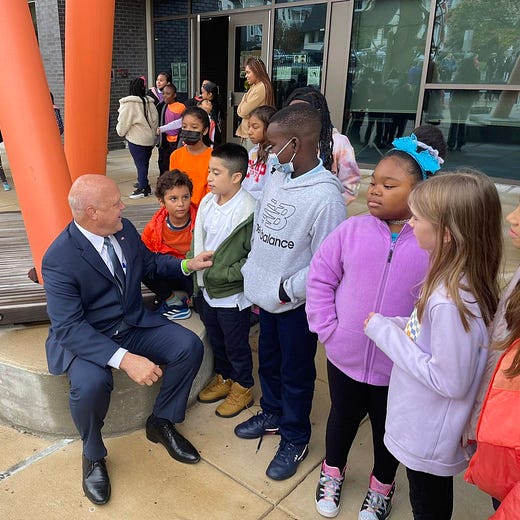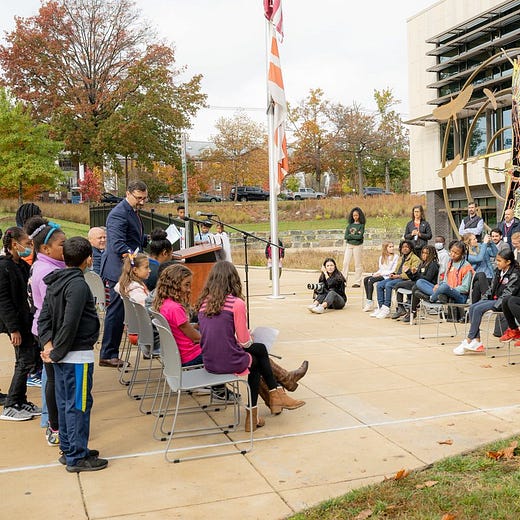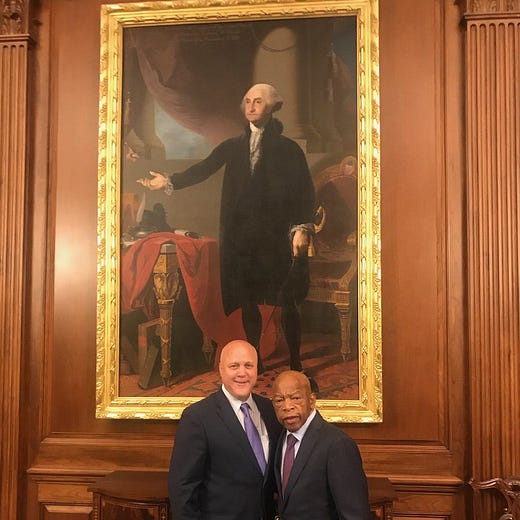The White House warns voters against “mega MAGA trickle-down” economics
Senior aides say the GOP’s plan fan the flames of inflation, make life worse for older adults and burden young people with the student debt that the president has promised to cancel.

👋🏾 Hi, hey, hello! Welcome back to Supercreator, your guide to the politicians, power brokers and policies shaping how creative professionals work and live in the new economy.
In today’s post, a preview of the White House’s closing economic argument 12 days before the midterm elections, how the Justice Department plans to protect voting rights in a volatile environment and what White House Infrastructure Implementation Coordinator Mitch Landrieu told me about the administration’s $1 billion investment in clean school buses.
But first, two updates from yesterday’s newsletter.
First, a reader responded to my interview with Dr. Cameron Webb on the updated COVID booster to express concerns about Long COVID and the impact of the relaxed mitigation efforts on high-risk communities:
“That’s great and I hope people get the booster to hopefully prevent severe disease, but the booster doesn’t prevent infection. The most important thing to do to prevent infection is wear a high-quality mask and take other protective measures like staying outside, not going unmasked indoors, ensuring everyone rapid tests if you're getting together, etc. My frustration is that all of these important measures are being ignored and not written about, and our vaccine-only approach is leading to mass infection which is causing Long COVID and a host of other health issues, because COVID causes serious long term bodily damage whether you're vaccinated or not.”
I’ve reached out to the White House for a response and will update you if I hear back.
Second, when I was reporting the story on the survey that found at least two in three nonwhite borrowers between the ages of 18-44 would spend their monthly savings on essentials like rent/mortgage, groceries, medical care/debt, child care debt or transportation, I reached out to Democratic Rep. Ayanna Pressley of Massachusetts for comment since she’s been a leading voice in Congress on student debt cancelation.
Pressley was unable to get back to me before deadline because she and Democratic Sen. Elizabeth Warren of Massachusetts were traveling the state to promote the student debt relief program and help borrowers apply. But she got back to Supercreator last night and here’s what she had to say:
“This survey affirms what we knew: that student debt cancellation will be life-changing for families across the country and President Biden’s historic decision to cancel student debt will bring meaningful relief to millions of people by helping them make ends meet, build generational wealth, and more,” Democratic Rep. Ayanna Pressley of Massachusetts said in a statement to Supercreator. “Black and brown families have been systematically denied the opportunity to build generational wealth due to discriminatory policies and so we know those borrowers have often had to take on far more student debt to pursue an education. In this moment of overlapping crises, it’s critical that everyone eligible receive this important relief, and I urge borrowers to continue submitting their applications for relief as soon as possible.”
I’ve also updated the original post with the congresswoman’s statement.
○ ● ●
The WH takes its closing economic message to upstate New York
“NEW TALKING POINT ALERT!”
That’s what I wrote in my notes last Friday when President Joe Biden characterized the Republican Party’s economic plan as “mega MAGA trickle down” during a speech on deficit reduction.
And the administration is running with as it makes its closing argument ahead of the midterms on why voters should give the president two more years of congressional Democratic leadership instead of sending his legislative agenda to purgatory under a Republican majority who will likely focus on investigating the Biden administration instead of the hard work of governing.
Senior administration officials on Wednesday evening walked reporters through a five-point plan that they say would fan the flames of inflation, make life worse for older adults and burden young people with the student debt that the president has promised to cancel. They said the election offers a choice between two economic visions, not a referendum on the past two years of Democratic leadership in the White House and on Capitol Hill. Obviously, Republicans would beg to differ.
The president will take his case to Syracuse later today where he’ll speak at Micron, a company that has pledged to invest $100 billion over the next 20 years to build factories that make semiconductors so American companies can produce more goods in America, which theoretically will lower the price of electronics, cars and more. The Micron investment promises to create tens of thousands of good-paying jobs with an average salary of $100,000 and gives the administration an opportunity to tout a trifecta of law — the CHIPS and Science Act, the Bipartisan Infrastructure Law and the Inflation Reduction Act — that it says has helped revitalize American manufacturing.
A growing frustration among Democrats is that Republicans have tried to have it both ways. They attack the legislation that the president and congressional Dems have passed as drivers of inflation and reckless spending while campaigning on the popular provisions in these bills back home to their constituents.
“The fact is that [Republicans] love what Democrats are doing. They just love to vote against it because they know that it'll pass anyway,” a source close to the administration told me on Wednesday. “So their message right now is saying that Dems don't care, that Dems aren't doing anything? The fact is that they love what we're doing. They just wish they were doing it.”
A spokesperson for the Republican National Committee did not respond to a request for comment.
One more gripe I’ve heard: Democrats haven’t spent too much time promoting their legislative record and not enough telling voters what they’d do with another two years in power.
A senior administration official disputed this claim and said the president has been clear on the focus of his pre-reelection agenda, including codifying Roe v. Wade, reauthorizing the assault weapons ban and continuing his work with congressional Democrats to lower costs for health care, prescription drugs and energy. And as I wrote in yesterday’s newsletter, Speaker Nancy Pelosi wrote House Democrats a letter that leadership would prioritize reauthorizing the expanded child tax credit and approving paid family and medical leave, free universal pre-K, affordable housing and bills to combat gas and grocery price gouging if they keep the majority. (Pelosi sent another letter last night encouraging members to promote the public safety legislation House Democrats passed before Congress went on recess against intense soft-on-crime attacks from Republicans.)
It’s worth noting though that Democrats have been historically lambasted for not bragging about their accomplishments. It feels disingenuous for party operatives to say that this is a liability if, in fact, the election is a referendum on Democratic leadership.
In related news: the Consumer Financial Protection Bureau on Wednesday announced two new actions on two types of “junk fees” that cost Americans billions of dollars and impact Black, brown and low-income communities the most.
The first includes surprise overdraft fees when the customer had enough money in their account to cover a debit charge at the time the bank authorized it. These fees can be as much as $36 a pop, according to the CFPB.
The second is against surprise depositor fees, usually in the range of $10 to $19, which occur when a consumer deposits a check that bounces even though they may have had no idea or control over whether the check would clear and are sometimes the victim of check fraud.
The CFPB said that both fees likely violate the Consumer Financial Protection Act prohibition on unfair practices when consumers cannot reasonably avoid them.
President Biden said the actions would save families at least $1 billion each year and builds on the work his administration has done to lower the costs of gas, high-speed internet and air travel.
● ○ ●
DOJ announces actions to protect voting rights
The Justice Department on Wednesday released its plan for how it will protect voting rights through Election Day, amid reports of voter intimidation and fears of violent threats. Some of the DOJ’s actions include:
A comprehensive Election Day program administered by the Civil Rights Division to monitor and receive complaints of violations of federal voting rights laws
A partnership between the 94 US Attorneys’ Offices and specially trained FBI personnel in each district to ensure that complaints from the public involving possible election fraud are handled appropriately
Collaboration between the National Security Division, FBI and US Attorneys’ offices to protect against national security threats.
“Our initiatives are working hard ahead of the midterms to combat voter suppression by educating voters and equipping them with the tools they need to make their voices heard at the ballot box,” a spokesperson for Civic Nation, an organizing hub for movements like When We All Vote, an initiative created by former First Lady Michelle Obama to ensure that voters know their rights and have a plan to vote, said in a statement to Supercreator. “The Justice Department's efforts are an important step forward in creating a safe voting environment for all Americans, specifically Black, Brown, young, working-class, and LGBTQ+ voters, and we know we have more work to do to make sure our democracy is accessible to all of us."
We The Action, another Civic Nation initiative, is recruiting thousands of lawyers for nonpartisan election protection projects.
Women are expected to shape the outcome of midterms and Jessica Jones Capparell, director of government affairs at the League of Women Voters of the United States, said in a statement to Supercreator that LWV appreciates the Department of Justice for taking the critical next steps to protect voters and ensure fair access to the ballot box on Election Day.
“Voters should feel confident casting their ballots, and we encourage all voters to create a voting plan on our website Vote411.org, to streamline the process on November 8th,” Capparell added. “If voters feel threatened, intimidated, or see issues at their polling locations they should contact the DOJ per their instructions or reach out to the non-profit-run election protection coalition through 866-OUR-VOTE.”
At press time, more than 13 million early votes have been cast with states like Georgia posting numbers on par with presidential elections. This has led critics of voting rights legislation to say that the movement to expand access to the polls is a partisan pursuit, not an attempt to strengthen democracy.
“It is wrong to suggest that there is a correlation between voter turnout and voter suppression because suppression is about barriers,” Stacey Abrams, the Democratic nominee for Georgia governor and founder of Fair Fight Action, an organization to fight voter suppression, said on Monday at a press conference. “If those barriers are not completely successful, the credit does not go to those who erected the barriers. The credit goes to those voters who found a way to navigate, overwhelm and overcome those barriers.”
White House Press Secretary Karine Jean-Pierre on Tuesday expressed a similar sentiment and told reporters President Biden is attuned to the issue.
“The President has been very clear that based on the Big Lie, there have been a host of anti-voter policies forced on states that challenge America’s fundamental right to vote. And so this is against our most basic values, including respect for the law and the Constitution,” Jean-Pierre said. “And speaking generally, high turnout and voter suppression can take place at the same time. [O]ne doesn’t have to happen on its own. They could be happening at the same time.”
● ● ○
“These kids understand that we’ve got to clean up the environment”
The White House on Thursday announced $1 billion in rebate awards from the Bipartisan Infrastructure Law to support the purchase of 2,463 buses, 95 percent of which will be electric.
Mitch Landrieu, White House Infrastructure Implementation Coordinator told me on Wednesday afternoon that during a visit to the John Lewis Elementary School in Washington, DC earlier in the day, students ranging from second to sixth grade were talking about the importance of having a clean environment so they can breathe healthy air.
“These kids knew more about this than I did. And so when they saw their school bus, they were like, ‘Man, that looks just like the school bus that we ride on,’ but it’s a different kind of engine and you don’t have to put gas in it,” Landrieu said. “Now you can plug it in, explain that to us. And they had solar panels on their school and it was just really exciting to see the bright eyes of these kids who understand really clearly that we’ve got to clean up the environment.”
Landrieu added that the investment will accomplish several things at once, including reducing greenhouse gas and pollution and improving the air that kids breathe. It will also level-up manufacturing and create jobs.
“And then finally, [it’s] just going to protect our children’s health. I mean, look, they got enough on their shoulders without having to worry about this,” Landrieu said. “So they need good school buildings, they need clean air, they need clean water and then they need all the other things that the infrastructure bill is going to give them like high-speed internet, so they can realize their God-given potential and grow up to take care of us and make a better world for us than we left them.”
The administration said the clean bus announcement is a small piece of a huge long-term trillion-dollar investment that will also fix roads, bridges and water systems too.
“All of these things in this bill are designed to make people's lives easier. And that's what's happening. Presidents for years and years and years have talked about this, but the president and vice president delivered it and this is going to get down to the ground,” Landrieu said. “On top of that, in order to make all this real, somebody’s got to do the work. So it’s going to produce a whole bunch of hight-paying jobs and give people access to build generational wealth, which is critically important, especially in the African-American community and other communities of color.”
Today in politics
President Biden this morning will receive his daily intelligence briefing before traveling this afternoon to Syracuse, New York to speak about his economic agenda and Micron investment. He will travel to Wilmington, Delaware this evening.
Vice President Harris is in DC and has no events on her public schedule.
The House and Senate are out.
Thanks for reading! Send me tips, comments and questions — or say hi: michael@supercreator.news.






